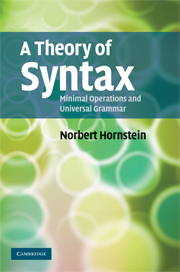Book contents
- Frontmatter
- Contents
- Preface
- 1 Minimalism and Darwin's Problem
- 2 Deriving c-command
- 3 Labels, recursion and movement
- 4 Some thoughts on adjunction
- 5 The emerging picture: Basic operations, FL and the Minimalist Program
- 6 Stop AGREEing! Keep Moving!
- 7 Conclusions, consequences and more questions
- References
- Index
1 - Minimalism and Darwin's Problem
Published online by Cambridge University Press: 01 July 2009
- Frontmatter
- Contents
- Preface
- 1 Minimalism and Darwin's Problem
- 2 Deriving c-command
- 3 Labels, recursion and movement
- 4 Some thoughts on adjunction
- 5 The emerging picture: Basic operations, FL and the Minimalist Program
- 6 Stop AGREEing! Keep Moving!
- 7 Conclusions, consequences and more questions
- References
- Index
Summary
Introduction
Contemporary generative theorists are united by (at least) one conviction and divided by (at least) one other. What unites everyone is the understanding that grammatical knowledge is rule based. Native speakers of a given language L have mastered rules for L that allows them to generate an unbounded number of tokens of L (i.e. sentences, phrases, etc.). Rules are required because the tokens of L are for all practical purposes infinite and thus cannot possibly be stored individually in a finite organism. The rule-based character of linguistic knowledge is, thus, not controversial among generative grammarians.
What is controversial is how these grammars are structured; what kinds of rules they allow, what kinds of primitive relations they exploit and what kinds of elements they involve. Here there is a lot of controversy. One line of inquiry with which I am very partial, the Minimalist Program, takes it as a boundary condition on inquiry that the basic operations of UG be simple and that the attested complexities of natural language be the result of the interactions of simple subsystems. This vision gains teeth when the meaning of “simple” is filled out. Here is how I understand the term.
There are several dimensions to simplicity.
First, simple systems are non-redundant. Redundancy arises in grammars when different operations can independently generate the same structural relations or different principles independently exclude them. An example (which is developed in more detail in later chapters) can serve to illustrate my meaning.
- Type
- Chapter
- Information
- A Theory of SyntaxMinimal Operations and Universal Grammar, pp. 1 - 16Publisher: Cambridge University PressPrint publication year: 2008



